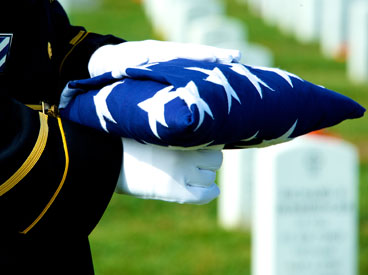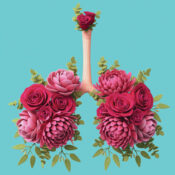Devra Lee Fishman’s dear friend and college roommate, Leslie, died from breast cancer one month shy of her 46th birthday after a four-year battle with the disease. Being with Leslie and her family at the end of her life inspired Devra to help care for others who are terminally ill. Each week, she documents her experiences volunteering at her local hospice in her blog, Hospice Girl Friday.
Recently my husband and I attended the funeral of Frank, a former community band mate of ours who died from brain cancer earlier this year. Frank’s wife also plays in the band and the four of us would often chat as we walked to our cars after our weekly rehearsals. We weren’t close friends and never saw each other socially outside of band, but after I saw Frank struggle to walk into rehearsal one evening I reached out to Betty and offered to come over to sit with Frank while she ran errands or just took a break from her 24/7 caregiving. Frank dozed the entire time my husband, Jim, and I sat with him but woke up to say goodbye just as we were leaving. Frank passed away the following week. He was 64.
Frank retired after 20 years in the navy and wanted to be inurned in Arlington National Cemetery, the hallowed and hauntingly beautiful burial ground a few miles from where we live. Because of his rank, Frank was sent off with full military honors that included an escort platoon, a colors team, a military band, and a horse-drawn caisson that carried Frank to his final resting place. Jim and I were honored to be there and surprised by what we learned about Frank’s life and legacy from his eulogists.
We knew Frank was a submariner, but we did not know that he retired as a commander. After he retired, he worked with a defense agency to create training and tools currently used by soldiers fighting today’s wars. We also knew that that he and Betty liked to tell stories, but we did not know that they once won the National Storytelling Network’s Oracle Award. And we did not know that Frank was in the process of writing several stories of his own before cancer robbed him of his words, and that Tom Clancy had dedicated one of his blockbuster books to him.
Jim and I were silent as our motorcade slowly traveled from the chapel to Frank’s final resting place. The air was unseasonably warm; the sky threatened to rain, but never did. I watched the clouds race by as though they were reminding us how quickly time goes. Then Jim voiced what I had been thinking.
“I wish I talked to Frank more than I did at band rehearsal.”
“Me too,” I said.
“I don’t know why I didn’t,” my husband said. “I would have loved to talk to him about his military career.”
“And I wish I had gone to hear him perform with his storytelling troupe,” I said.
“Why didn’t we?” my husband asked.
As Jim’s question hung in the air between, us I thought about the time–soon after I became a hospice volunteer–that I read an obituary of a long-term patient. A nurse had clipped it out of the paper and tacked it to the bulletin board in our conference room. The patient lived in our hospice for several months, but I never knew that she was once a college professor, or that she played the piano and was a gourmet cook. Of course the nurse already knew that about the patient because they talked on a daily basis and, more importantly, the nurse cared enough to ask.
Back then I preferred to keep my distance from the patients I met because I was still coping with the pain of losing my dear friend Leslie and did not want to get close to anyone I knew I would have to mourn before long. Also, since most patients stayed in our hospice unit for only a few days before they went home or passed away, I had rationalized that there was not enough time to forge any kind of meaningful relationship. Sometimes my fear of grief still causes me to think and act like that.
With Frank, however, there were plenty of opportunities, and I regret that I decided long ago that other than band, he and I had nothing in common, so I kept my distance. I use that rationalization too often to mitigate loss, grief, and pain–the inevitable payoffs that come from investing emotionally in personal relationships.
As a hospice volunteer, I am reminded every week how fleeting this life is–something I thought I knew and knew better than many others. But as I rode in Frank’s funeral procession, grateful for what I learned about him that day, I wished I hadn’t taken this long to realize that getting to know someone like Frank, or any of my hospice patients, would only enrich my life no matter how little we might have in common or how much time we might have together.
Regret never fades, but in the long run, the memories of shared experiences and stories outlive any grief. I know that now. Frank knew that because he believed in the value of a good story. I learned at his funeral that he also believed there is an appropriate Gilbert & Sullivan quote for every occasion–something else I wish I had known about him. Betty chose this perfectly apt one from The Yeoman of the Guard to end Frank’s memorial service:
Is life a boon?
If so, it must befall
That Death, whene’er he call,
Must call too soon.
Rest in peace, my friend.
Previous post: A Case for Comfort Animals Next post: The Power of Compassion
Become a Saturday Evening Post member and enjoy unlimited access. Subscribe now



